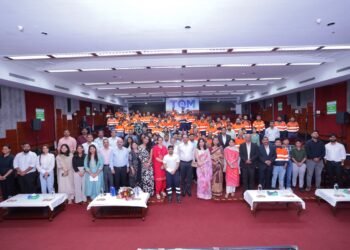By Rush Guha
Introduction
In the hushed corners of a college library, a tenacious engineer battles a formidable math problem, his dedication pushing him to the brink of exhaustion. With sleep sacrificed and numerous failures endured, his perseverance finally yields a triumphant breakthrough. Yet, his elation is short-lived as bureaucratic rigidity threatens to extinguish his dreams. This poignant scene evokes the tragic fate of Joy Lowbo, reminiscent of Emile Durkheim’s sociological study of suicide and its contemporary implications.
Durkheim’s Insights into Modern Realities
Emile Durkheim’s seminal study on suicide, dating back to 1897, resonates even in our globalized world. Rooted in secondary data from local police, Durkheim’s functionalist analysis identified four major categories of suicide: altruistic, egoistic, anomic, and fatalistic. He employed integration and regulation as parameters to explore these phenomena, revealing insights that continue to hold weight today. His examination of variables such as marital status, locality, religious orientation, and sex showcased the intricate interplay between social factors and suicide rates. His findings unveiled a society where low integration and regulation correlated with heightened suicidal tendencies.
Contemporary Relevance and Global Dimensions
Modern society reflects Durkheim’s concepts through the prevalence of egoistic and anomic suicides. A sobering 2018 report from the World Health Organization (WHO) underscores suicide’s alarming global toll, especially among the youth. While Durkheim’s locality-based observations have evolved due to shifting global realities, his core insights remain pertinent. This is particularly evident in the Indian context, as underscored by the 2022 National Crime Records Bureau (NCRB) report revealing a distressing surge in suicide rates.
Addressing the Crisis: A National Strategy for Suicide Prevention
India confronts this pressing challenge head-on, exemplified by the Union Ministry of Health and Family Welfare’s launch of the National Strategy for Suicide Prevention. Aligned with WHO guidelines, this visionary strategy aspires to reduce suicide rates by 10% by 2030. The blueprint encompasses robust surveillance mechanisms, establishment of psychiatric outpatient departments, and integration of mental well-being education in schools. This strategy aims not only to combat suicide but also to dismantle societal stigmas associated with mental health.
Shaping a Compassionate Future
As this multifaceted strategy takes shape, it emphasizes responsible media coverage of suicide incidents and the integration of mental well-being education in schools. These steps are poised to foster community awareness, alleviate stigma, and ignite conversations about mental health. India’s progressive approach to suicide prevention serves as a beacon of hope, challenging long-standing taboos and standing as a global example of compassion and resilience.
Conclusion
The harrowing tale of the determined engineer and the echoes of Joy Lowbo’s tragic end converge with Emile Durkheim’s sociological insights, casting a spotlight on the persistent challenges of suicide in our contemporary world. Durkheim’s theories find renewed relevance as societies grapple with evolving factors, yet his core observations about integration, regulation, and societal influence continue to offer invaluable insights. Through a comprehensive and compassionate approach, nations like India are forging paths toward greater awareness, understanding, and prevention of this critical issue.
About the Author
Rush Guha, United Nations and an IUCN CEESP Member.























